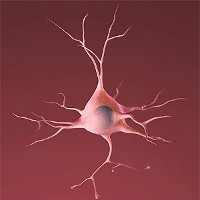28 April 2014. BrainStorm Cell Therapeutics, in New York and Israel, says the U.S. Food and Drug Administration approved its beginning an intermediate stage clinical trial of a stem cell-based therapy for amyotrophic lateral sclerosis or ALS, also known as Lou Gehrig’s disease. The trial will test for safety and tolerability of the company’s treatments that transplant cultured stem cells, but will also track indicators of efficacy against a placebo.
ALS is a progressive neurodegenerative disease where neurons or nerve cells controlling muscles in the body begin to waste away, and can no longer send or receive signals from the brain or spinal cord. As the nerve cells stop functioning, the muscles in the limbs, and later speech and breathing muscles, begin weakening and eventually stop functioning. Most people with the disease die of respiratory failure.
BrainStorm’s technology, called NurOwn, extracts stem cells from the patient’s bone marrow that are transformed into cells supporting development of nerve cells. These transformed stem cells, says the company, secrete proteins called neurotrophic factors that protect nerve cells, as well as encourage their growth and interactions with muscles. Because the original cells come from the patient, they have little risk of rejection by the immune system.
The new trial plans to enroll 48 patients diagnosed with ALS at three sites: Massachusetts General Hospital in Boston, University of Massachusetts Medical School in Worcester, and Mayo Clinic in Rochester, Minnesota. The transplanted stem cells for the Massachusetts sites will be cultured at Dana-Farber Cancer Institute in Boston. The Mayo Clinic will produce stem cells for its part of the trial. Enrollment of patients has not yet begun.
Participants will be divided between those receiving stem cell transplants and those receiving identical placebo transplants with injections into muscles, brain, or spinal cord. Safety will be measured by the number of patients that encounter adverse events. Patients will also be evaluated according to a standard ALS functional rating scale and a measure of respiratory function over 24 weeks.
Brainstorm reports an early stage clinical trial in Israel with 12 ALS patients showed the treatments are safe, well tolerated, and pose no undue risks to the patients. The company also has underway another intermediate stage trial with ALS patients testing various doses of transplanted stem cells.
Read more:
- Start-Up Developing Gene Therapies Lands $45M in Early Funds
- Mayo Clinic Taking Part in ALS Stem Cell Clinical Trial
- Stem Cell Therapy Aids Patient with ALS, Myasthenia Gravis
- Clinical Trial of ALS Stem Cell Therapy Begins Treatments
- Trial Fails to Show Biogen Idec ALS Drug Efficacy
* * *


 RSS - Posts
RSS - Posts
You must be logged in to post a comment.